
‘Dangerously out of touch’: Menendez under fire for attacking Iran diplomacy
Advocates for a peaceful U.S. foreign policy denounced Sen. Bob Menendez on Wednesday after the New Jersey Democrat gave a speech that criticized the White House’s effort to revive the Iran nuclear deal jettisoned by former President Donald Trump, demanded “stricter” enforcement of sanctions, and endorsed the possible use of “military force.”
In remarks delivered from the Senate floor Tuesday night, Menendez, chair of the Senate Foreign Relations Committee, reaired his grievances with the 2015 Joint Comprehensive Plan of Action (JCPOA), attacked President Joe Biden for trying to restore the accord that Trump abandonedin 2018, and called for “vigorously enforcing the sanctions we have in place” and making “a credible military threat should Iran breach certain red lines.”
In response, National Iranian American Council policy director Ryan Costello said Wednesday in a statement that “Menendez has been dangerously out of touch on Iran for years.”
“He tried to kill [former President Barack] Obama’s diplomacy by imposing sanctions in the middle of talks, and now is taking explicit aim at Biden’s,” said Costello. “Like the other Iran hawks, Menendez has never proposed a viable alternative that could do a tenth of what the JCPOA accomplished and could achieve again.”
Stephen Miles, president of Win Without War, said Wednesday that Senate Majority Leader Chuck Schumer (D-N.Y.) should appoint someone to lead the Senate Foreign Relations Committee “who actually believes in diplomacy, instead of someone who [has] spent decades pushing a path to war with Iran.”
While the Biden administration insisted one year ago that Tehran must halt its uranium enrichment program before Washington rejoins the JCPOA, then-Iranian Foreign Minister Mohammad Javad Zarif countered that “it was the United States that left the deal [and] it was the United States that violated the deal” over three years ago when Trump withdrew from the agreement and imposed devastating sanctions on Iran.
“Iran never left the deal,” Zarif told CNN host Fareed Zakaria last February. “Iran is in the deal. Iran has reduced some of its commitments, in line with the deal,” he said, referring to Iran’s decision to resume uranium enrichment—though well below levels required to develop nuclear weapons—after the Trump administration breached the agreement by reinstating sanctions.
“The way to go back to full compliance,” Zarif added, “is for the United States, which has totally left the deal, to come back and implement its obligations,” starting with sanctions relief.
The other JCPOA signatories are China, France, Germany, Russia, the United Kingdom, and the European Union. After an April meeting in Vienna, negotiations on the deal briefly came to a halt in June following the election of Iranian President Ebrahim Raisi.
In addition to depriving Iranians of food and medicine—which has exacerbated the nation’s Covid-19 death toll—experts have argued that U.S. sanctions on Iran contributed to Raisi’s victory.
Negotiations have since resumed and a deal is reportedly within reach despite Menendez’s bellicose speech.
The New York Times reported earlier this week that “the United States and its European allies appear on the cusp of restoring the deal that limited Iran’s nuclear program, Biden administration officials said on Monday, but cautioned that it is now up to the new government in Tehran to decide whether, after months of negotiations, it is willing to dismantle much of its nuclear production equipment in return for sanctions relief.”
Although Biden lifted some sanctions on a handful of former Iranian officials last June in a bid to jump-start stalled nuclear talks, he has refused to provide broad relief and even imposed new sanctions in October, just two days after Iran’s new nuclear negotiator announced that his country would once again participate in talks aimed at restoring the deal.
Dozens of civil society organizations and anti-war groups responded by urgingBiden “to choose the proven path of peace” and re-enter the pact.
“We’ve delayed long enough,” Sara Haghdoosti, deputy director of Win Without War, said in late November as negotiations resumed in Vienna. “For the sake of peace, for the sake of prosperity, for the security of people in Iran and the United States alike, it’s time to put differences aside and return to the Iran nuclear deal.”
Biden, who promised on the campaign trail to work quickly to rejoin the JCPOA, may be running out of time to make good on his pledge, underscoring the need for swift diplomacy.
Echoing a belligerent statement made in December by what journalist Jeremy Scahill called “a hawkish gaggle of former U.S. national security officials, lawmakers, and diplomats,” Menendez said Tuesday that “Iran must also fully understand that the United States will not hesitate to take any action necessary to protect our interests and those of our allies, and that includes the use of military force where appropriate and necessary.”
Costello said in response that “while he emphasizes his stylistic differences with Trump’s Iran policy, Menendez offers the exact same proposals as the previous administration that got us into this mess.”
“Does Sen. Menendez really think that more sanctions, more threats of war, and cutting off diplomacy under Biden will play out differently than it did under Trump?” Costello added. “It is past time for Menendez to give up this act and let America’s diplomats do their jobs and restore the nuclear deal.”


